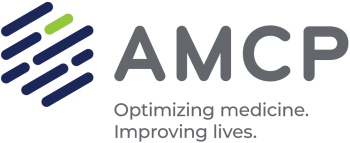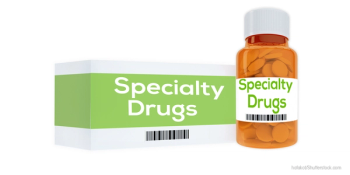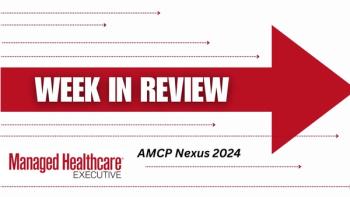
Milliman’s Jennifer Cruz says plans are losing rebates because of steep price discounts negotiated under the Inflation Reduction Act. but that they need to be sure that renegotiation of rebate guarantees doesn’t get too broad.

Milliman’s Jennifer Cruz says plans are losing rebates because of steep price discounts negotiated under the Inflation Reduction Act. but that they need to be sure that renegotiation of rebate guarantees doesn’t get too broad.

Pharmacy benefit managers are approaching health plans with value-based contracts that consider lower costs on the medical benefit of the insurance, says Jennifer Cruz of Milliman.

Almost 3,000 managed care pharmacy leaders attended the Academy of Managed Care Pharmacy (AMCP) Nexus meeting, which was held last week at the Gaylord National Resort and Convention Center in National Harbor, Maryland.

Milliman's Jennifer Cruz, Pharm.D., said health plans should be able to track rebates to their book of business and have strong audit rights.

Prior authorization using integrated medical claims data helps diabetes patients get medications faster, with two-thirds processed automatically by July 2025 in this Prime Therapeutics analysis.

Prime Therapeutics executives discuss specialty drug trends at AMCP Nexus. Key areas include autoimmune therapies, multiple sclerosis treatments, and emerging cell and gene therapy challenges for payers.

AI revolutionizes member health risk identification, outperforming traditional models by integrating diverse data for proactive care in managed care settings.

Cardiovascular, Renal and Metabolic Conditions Increasingly Prevalent, Expensive for Medicare Fee-For-Service Population

'It just knows black or white; it does not know the gray in between...humans have to fill that gray in between.'

Bispecific T-cell engagers demonstrate lower total costs and reduced cytokine release and neurotoxicity rates compared with CAR T therapy for patients with follicular lymphoma.

Payers and providers are using real-world data to identify high-performing treatment centers, reduce administrative bottlenecks, and support value-based contracting arrangements.

New data reveals a rising trend in generalized anxiety disorder (GAD) prevalence among U.S. adults, emphasizing the need for improved diagnosis and treatment.

An abstract presented at AMCP Nexus 2025 showed that Medicaid drug spend in 10 states in FY 2023 was approximately equal to or less than the national drug spending rate of 14%.

Former House Speaker Paul Ryan called for evidence-based reforms, risk pools and premium support models for Medicare, to fix the nation’s strained healthcare system.

Panelists at AMCP’s policy summit debated PBM reform, disagreeing on spread pricing ethics and rebate transparency while discussing costs, risks, and whether current contracting models benefit patients.

A study at AMCP Nexus 2025 reveals how drug rebates and net prices influence insurance coverage for specialty drugs, impacting patient access.

An abstract presented at AMCP Nexus 2025 showed the overuse of opioids following successful cancer treatment is detrimental to patient health and expensive.

"It’s people versus business interests, party interests, and ideology," Robert Costa of CBS News told the AMCP Nexus audience.

There is a need for strict policies regarding the use of AI in the managed care space, according to Douglas S. Burgoyne, Pharm.D., MBA, FAMCP, adjunct associate professor at the University of Utah College of Pharmacy.

Health plans and PBMs are using AI to aggregate data, summarize information and enhance their formulary decision-making processes, according to Douglas S. Burgoyne, Pharm.D., MBA, FAMCP, adjunct associate professor at the University of Utah College of Pharmacy.

Technology can help address the complexities of specialty medications by automating processes and enabling proactive interventions to ensure patients stay on their critical therapies, according to Kristen Whelchel, Pharm.D., CSP, Research and Patient Care Improvement Pharmacist with Vanderbilt Specialty Pharmacy's Department of Health Outcomes and Research.

Here’s what you missed this week on Managed Healthcare Executive.

Only 15% of those who start a glucagon-like peptide 1 (GLP-1) for weight loss are still taking it two years later according to Prime Therapeutics’ real-world evidence, says Ben Urick, Pharm.D., Ph.D., a health outcomes researcher for the pharmacy benefit manager.

Kristen Whelchel, Pharm.D., CSP, Research and Patient Care Improvement Pharmacist with Vanderbilt Specialty Pharmacy's Department of Health Outcomes and Research, explains how technology identifies at-risk patients, coordinates medication refills and more.

The FDA has already made more than a dozen cancer drug approval decisions this year and more expected in the next several months and in early 2025, according to Kaelyn Boss, who gave an oncology drug pipeline talk at the 2024 AMCP Nexus meeting this week.

Large PBMs are removing Humira from some of their formularies. AMCP Nexus panelists still see challenges and a need for education and more attention to patient interests.

Crescent Moore, Ph.D., Pharm.D., Director of Part D/Pharmacy at BluePeak Advisors, highlights the expected shift of Medicare beneficiaries towards Medicare Advantage Prescription Drug (MA-PD) plans.

Crescent Moore, Ph.D., Pharm.D., Director of Part D/Pharmacy at BluePeak Advisors, explains the impacts of the upcoming changes to Medicare Part D.

Charlie Dragovich, Senior Director and Client Strategist at Cencora, talks about the way regulations usually work and how the road to the Preapproval Information Exchange Act was different.

An overview of the preapproval information exchange (PIE) from Charlie Dragovich, Senior Director and Client Strategist at Cencora